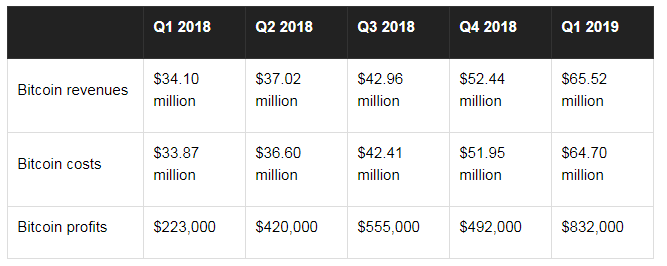Square's Bitcoin Platform Remains Surprisingly Profitable

Square (NYSE:SQ) added bitcoin trading to its Cash App in early 2018. The company buys bitcoin and adds a slight margin to the purchase price, but doesn't charge additional transaction fees. Users can buy up to $10,000 in bitcoins weekly, but there aren't any limits on selling.
By the end of 2018, Cash App overtook Coindesk as the top app for bitcoin purchases. Buying bitcoin through Cash, which was linked to a user's bank or credit card accounts, was more efficient than using other exchanges that still required individual wire transfers.
The volatile price of bitcoin, which soared above $13,000 in late 2017 and plunged to about $3,000 earlier this year, made Square's bitcoin bet seem risky. Yet the business remained profitable, and generated $65.5 million in revenue last quarter -- marking its strongest quarter to date.
Why Square's bitcoin platform is a low-risk operation
Square isn't buying large amounts of bitcoin and hoping the price rises. Instead, it only buys bitcoin to fulfill users' orders, making it a middleman between users and exchanges.
The only profit Square generates is the small margin it adds to bitcoin's market price. That conservative strategy has kept the business consistently profitable since its inception:

Square's bitcoin revenue accounted for 6.8% of its net revenue during the first quarter, compared to 5.1% in the prior year quarter. However, Square's bitcoin profits only accounted for about 0.2% of its gross profit during the quarter, versus less than 0.1% a year earlier.
Square's bitcoin business won't move the needle anytime soon, but its top and bottom line growth is impressive, especially since bitcoin shed roughly 40% of its value over the past 12 months. If bitcoin's price rises again and it attracts more buyers, Square's bitcoin revenue and gross profits could surge much higher.
Another piece of Square's Cash strategy
Instead of viewing Square's bitcoin platform as a separate business, investors should see it as part of the company's long-term plan to lock users into its Cash App. Cash is one of the top peer-to-peer payment apps in the U.S. alongside PayPal's (NASDAQ:PYPL) Venmo and the bank-based Zelle, and it's still growing rapidly.
Last quarter Square stated that its Cash App payment volume rose nearly 2.5 times annually. For comparison, PayPal stated that Venmo's payment volume rose 73% annually in its most recent quarter.
During the conference call, CFO Amrita Ahuja noted that Cash consistently ranked as a top 20 iOS app in the U.S., and that the Cash Card -- a physical debit card linked to the app -- "drove higher engagement" with "increasing attach rates and an increase in the frequency of usage per card active."
Square stated that the growth of Cash, its Caviar food delivery service, its Instant Deposit service for merchants, and its financing arm Square Capital all boosted its subscription and services revenue, which surged 126% annually during the quarter and accounted for 23% of its net revenue -- compared to 14% a year earlier.
The growth of that business is essential to Square for three reasons: It locks in merchants and consumers, boosts its higher-margin revenue per merchant, and widens its moat against rivals like PayPal. Adding bitcoin trades complements that strategy since PayPal still doesn't offer bitcoin purchases on its core platform or Venmo.
Other rivals on the horizon
PayPal might not be interested in bitcoin purchases yet, but other rivals are on the horizon. E*Trade (NASDAQ:ETFC) and TD Ameritrade (NASDAQ:AMTD), which already let customers trade bitcoin futures, are reportedly testing out bitcoin purchases.
Customers might prefer buying bitcoin on those brokerage platforms, where they can monitor their bitcoin purchases alongside their other investments. However, Square's Cash App might still be an attractive bitcoin option for buyers who don't hold big portfolios of stocks and bonds.
The bottom line
Square's decision to sell bitcoin on its Cash App was a smart move. It definitely won't become a major growth engine anytime soon, but it will likely stay profitable, lock more users into its Cash ecosystem, and differentiate it from rivals like Venmo and Zelle.
This article originally appeared in the Motley Fool.
Leo Sun owns shares of Square. The Motley Fool owns shares of and recommends PayPal Holdings and Square. The Motley Fool has a disclosure policy.




















